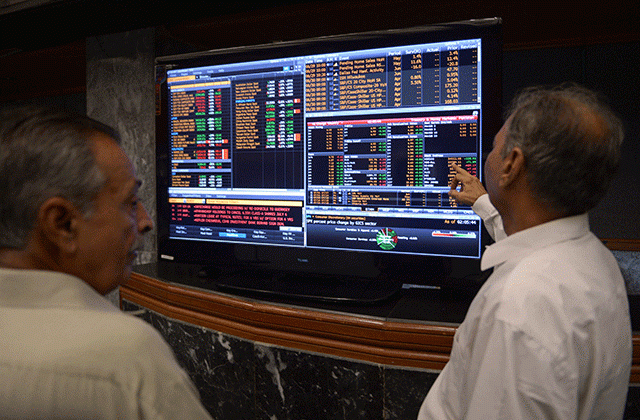Heightened tensions along the Pakistan-Afghan border over the weekend sent shockwaves through financial markets, causing panic on the Pakistan Stock Exchange (PSX) on Monday.
Investor confidence was hit hard, with the benchmark KSE-100 index plunging more than 4,500 points in a single trading session, amid growing fears of regional instability. Shares suffered a slowdown, losing 4,654 points and stabilizing at 158,443.
The market rout follows reports of deadly nighttime clashes along the Pakistan-Afghan border, where at least 23 Pakistani soldiers were martyred and over 200 militants killed in an attack allegedly launched from Afghan territory, according to the Inter-Services Public Relations (ISPR).
Read: Pakistan warns of direct strikes on Afghan soil after cross-border attacks
The escalation comes at a time when the PSX was already showing signs of stress, with investors unsettled by uncertainty surrounding the IMF program in Pakistan and the broader economic outlook. The KSE-100 index fell 3.5% last week to close at 163,098.19 points, weighed down by a reduction in volumes and profit-taking after a chaotic opening.
Waqas Ghani, head of equity research at JS Global, said The Express PK Press Club that the market has lost around 9,500 points in the last six sessions, due to weak investor sentiment amid escalating cross-border tensions between Pakistan and Afghanistan. “The index fell to an intra-day low of 5,031 points or 3.1 per cent due to geopolitical uncertainty that triggered widespread selling in key sectors including banking, energy and cement as investors remained cautious.”
KTrade Securities stock trader Ahmed Sheraz observed that PSX continues to recover from a series of negative developments, with the benchmark KSE-100 losing around 4,654 points (-2.85%) to close at 158,443 points.
Learn more: TLP protest paralyzes Islamabad roads
Market sentiment, already fragile due to dwindling expectations of a policy rate cut at the next Monetary Policy Committee (MPC) meeting and increased scrutiny from the International Monetary Fund (IMF) during its ongoing program review, was further undermined by deteriorating security conditions.
Furthermore, the recent wave of terrorist attacks, which claimed the lives of several security agents, has significantly shaken investor confidence. Pakistan retaliated by taking action against banned Tehreek-i-Taliban Pakistan (TTP) units across the Afghan border.
Tensions have also been high since clashes between police and the Tehreek-e-Labaik Pakistan (TLP) erupted last week, first in Punjab and then across the country. These developments have introduced additional layers of uncertainty to the stock market.
Given the volatile security environment and the ongoing IMF review, Sheraz expects market sentiment to remain highly sensitive in the near term. Any developments on either front are likely to significantly influence investor behavior and market direction, he said.




